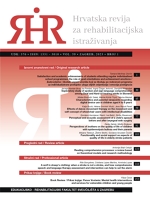Functionality and social support as aspects of quality of life in elderly stroke patients
Functionality and social support as aspects of quality of life in elderly stroke patients
Author(s): Mirjana Telebuh, Želimir Bertić, Gordana Grozdek ČovčićSubject(s): Sociology, Health and medicine and law, Family and social welfare, Welfare services
Published by: Sveučilište u Zagrebu, Edukacijsko-rehabilitacijski fakultet
Keywords: functionality; social support; quality of life; stroke; elderly;
Summary/Abstract: Functionality in activities of daily living and social support are often used as indicators of quality of life, especially in research involving gerontological and geriatric populations that assesses the functional independence of the patient and their need to rely on help from others. The effects of a stroke can significantly reduce the quality of life of the elderly. Therefore, the aim of this paper was to examine the relationship between functionality and social support and the quality of life of elderly stroke patients. This study included 50 stroke patients over the age of 65 years. All the participants lived at home in Zagreb. The participants’ quality of life was measured using The World Health Organization Quality of Life Brief Version (WHOQOL-BREF questionnaire), which determines quality of life based on four domains (Physical, Psychological, Social relationships, and Environment). Functionality was measured using the Functional Independence Measure, while social support was measured using the Social Support Scale. The correlation between functionality and quality of life was statistically significant with respect to physical health (r = 0.77, p < 0.00), as well as psychological health (r = 0.53, p < 0.00). The correlation between social support and quality of life was also significant with respect to social support from friends in the Social relationships domain (r = 0.40, p < 0.00) and in the Environment domain (r = 0.45, p < 0.00), as well as in the overall social support in Social relationships (r = 0.29, p < 0.04) and Environment domains (r = 0.35, p < 0.01). A higher level of functionality indicates a higher quality of life in the Physical and Psychological domains, as well as in the overall quality of life of elderly stroke patients. Strong social support from friends can encourage and help elderly stroke patients to integrate into their social environment more successfully, thus potentially increasing their quality of life. The results of this study imply that functionality and social support can be important factors in the quality of life in elderly stroke patients.
Journal: Hrvatska revija za rehabilitacijska istrazivanja
- Issue Year: 59/2023
- Issue No: 1
- Page Range: 103-121
- Page Count: 19
- Language: English

